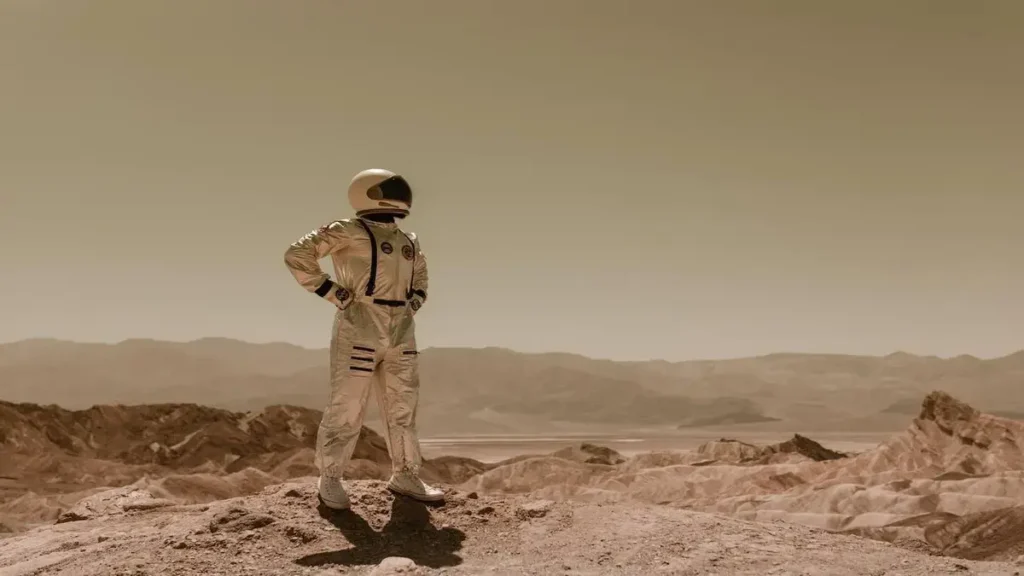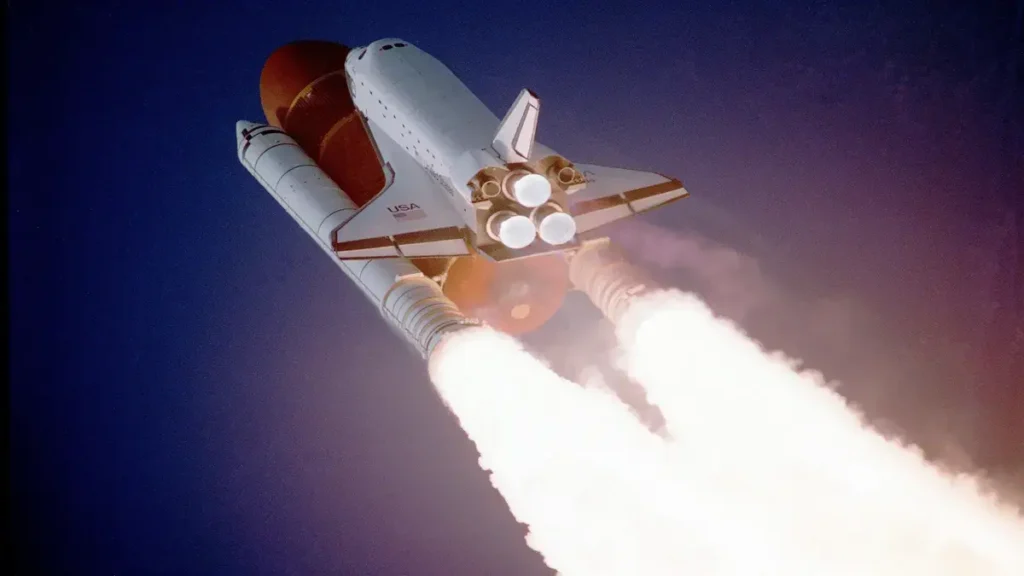Mars Colonization Ventures Beyond Earth
Mars colonization isn’t just a scene from a science fiction movie; it’s a real future that we’re paving the road towards. Stepping into the shoes of pioneers venturing beyond our planet, we find ourselves at the edge of a new world full of challenges and wonders. As we imagine the daily lives of these brave settlers, we uncover the complexities they face in this harsh, uncharted terrain. On this journey, it’s not just the technology and tools that will secure their survival but also their spirit and determination to redefine what it means to call a place home, amidst the red dust and alien skies of a distant world.
Key Takeaway
- Mars trips could offer new homes
- Scientists work to grow food on Mars
- Spacecraft will be built for long journeys
- Mars has water ice, which is very helpful
- Robots are sent first to set up and explore

Unveiling the Challenges of Mars Colonization
Mars Colonization is a hot topic in the world of space exploration. Many people dream about living on Mars one day. But, there are big problems we need to solve first. Let’s talk about these challenges.
Getting to Mars is Hard
First, we need to get to Mars. This is very difficult. Space travel takes a long time and is dangerous. The trip to Mars can take about six to nine months. That’s a long time to be in a spaceship!
Space Travel Dangers
- Space Radiation: In space, there’s a lot of radiation. This can make astronauts sick.
- No Air or Food: In space, we need to bring our own air to breathe and food to eat. We can’t just open a window or go to the store.
- Space Sickness: Being in space can make you feel sick. Your body isn’t used to floating around!
Living on Mars Isn’t Easy
Once we get to Mars, we have to live there. Mars is not like Earth. It’s cold, there’s hardly any air, and there’s no liquid water on the surface.
Problems on Mars
- Building Homes: We need to build places to live that can protect us from the cold and radiation.
- Growing Food: We can’t grow food in the Martian soil right away. We need to figure out how to farm on Mars.
- Health Care: If someone gets sick or hurt, we need to have doctors and medicine on Mars.
Technology Needs to Get Better
To live on Mars, we need better technology. We need spaceships that can go back and forth, tools to build homes, and ways to make air and water.
Technology We Need
| Technology | Why We Need It |
|---|---|
| Spaceships | To travel to Mars and come back home |
| Building Tools | To make homes and other buildings on Mars |
| Life Support | To make air to breathe and clean water to drink |
It Costs a Lot of Money
Mars Colonization is very expensive. We need a lot of money to build spaceships, tools, and homes. Countries and companies are trying to find ways to pay for it.
Money Matters
- Building Spaceships: Spaceships cost billions of dollars to build.
- Training Astronauts: Astronauts need a lot of training before they go to Mars. This training costs money.
- Research: Scientists need to do experiments and studies to learn how to live on Mars. This research isn’t free.
Working Together is Important
Many countries and companies want to help with Mars Colonization. They need to work together. Sharing ideas and resources can make it easier to solve these big problems.
Teamwork in Space
- Sharing Knowledge: When we share what we know, we can learn faster.
- Helping Each Other: If one country has a problem, another might have a solution.
- Building Together: Making things for Mars is easier if we do it together.
Protecting Mars’ Environment
We need to take care of Mars, just like we take care of Earth. We don’t want to make Mars dirty or hurt any life that might be there.
Caring for Mars
- Not Polluting: We should try not to leave trash on Mars.
- Looking for Life: We need to be careful not to harm any tiny creatures that might live on Mars.
- Using Resources Wisely: We should use what Mars has carefully, so we don’t run out.
In my opinion, Mars Colonization is one of the most exciting things humans are trying to do. But, it’s also very hard. We need to be smart, work together, and take care of Mars. If we do these things, maybe one day people will live on Mars. But, we have a lot of work to do before that can happen.
Health Risks in Space
Space can be bad for your health. Being in space for a long time can make your muscles weak and your bones not as strong. We need to find ways to keep astronauts healthy.
Staying Healthy in Space
| Health Risk | How to Help |
|---|---|
| Weak Muscles | Exercise machines in the spaceship |
| Weak Bones | Special diets and maybe medicines |
| Space Sickness | Training on Earth to get used to space |
Communication with Earth
Talking to people on Earth from Mars is not easy. There’s a delay, which means messages take time to go back and forth. We need good ways to talk to each other.
Keeping in Touch
- Radio Signals: We use radio waves to send messages, but they’re slow.
- Internet in Space: Maybe we can set up a kind of internet for space.
- Space Mail: We might send physical mail with spaceships that go back to Earth.
Even though there are many challenges, I think it’s important to keep trying. Mars Colonization could teach us a lot and help us take care of our own planet better. We just need to make sure we’re ready for the big job of living on another planet.

The Daily Life of Pioneers in Mars Colonization
Imagine waking up to a reddish sky every morning. That’s a normal day for pioneers in Mars Colonization. Their lives are filled with new challenges and exciting tasks. Let’s dive into what a day on Mars might look like for these brave explorers.
Morning Routine
On Mars, the day starts with a health check. Living on a different planet means you have to make sure your body is doing okay. Pioneers use cool gadgets to check their health every day.
- Check oxygen levels
- Measure heart rate
- Do some stretches
After that, it’s time for breakfast. But don’t expect pancakes or eggs! Food on Mars is mostly freeze-dried or packed with nutrients to keep the body strong.
What’s for Breakfast?
| Food Item | Description |
|---|---|
| Space Cereal | A crunchy, nutrient-packed meal to start the day. |
| Martian Smoothie | A blend of vitamins and minerals with a fruity taste. |
| Protein Bars | Easy to eat and full of energy. |
Work and Research
Pioneers on Mars have a lot of work to do. They need to study the red planet and figure out how to live there. They do experiments, grow plants, and even fix robots.
One important job is to take care of the plants. Plants are not just for food, but they also help make air for breathing. Pioneers use special lights to help plants grow.
Another big part of the day is exploring. Pioneers put on their space suits and walk outside to collect rocks and dust. They want to learn as much as they can about Mars.
Typical Work Tasks
| Task | Purpose |
|---|---|
| Soil Testing | To see if plants can grow in Martian soil. |
| Drone Flights | To map the surface of Mars from the sky. |
| Equipment Repair | To fix any machines or tools that break. |
Afternoon Activities
After lunch, pioneers often have some free time. They might exercise to keep their muscles strong. Mars has less gravity than Earth, so exercise is super important.
They also might call their families back on Earth. It’s a bit strange because there’s a delay in the calls. When you talk to someone on Mars, it takes a few minutes for them to hear you!
Some pioneers like to write or draw about their experiences. It’s a way to remember this amazing adventure and share it with others.
Fun Mars Facts
| Fact | Explanation |
|---|---|
| Day Length | A day on Mars is just a bit longer than a day on Earth. |
| Gravity | Mars has about 1/3 of Earth’s gravity, which means you’d feel lighter. |
| Temperature | Mars can get really cold, so pioneers need to wear special suits outside. |
Evening Chores
Before dinner, there’s more work to do. Pioneers might fix their living space or check on the energy supply. They use solar panels to get power from the sun, but they always need to make sure there’s enough energy for the night.
Cleaning is also a big deal on Mars. Everything needs to be super clean to keep everyone healthy. Pioneers use special wipes and vacuums to clean up dust and dirt.
Why Cleanliness is Key
| Reason | Why It’s Important |
|---|---|
| Prevent Illness | Germs can be more dangerous on Mars, so cleaning helps keep pioneers safe. |
| Protect Equipment | Dust can damage machines, so it’s important to keep things clean. |
| Maintain Air Quality | Clean air is needed for breathing, and dust can mess that up. |
Winding Down
At the end of the day, pioneers relax a bit. They might watch movies, play games, or read books. It’s important to have fun and relax the mind after a busy day.
Before bed, they look out the windows at the stars. It’s a good time to think about how far they’ve come. Living on Mars is not easy, but it’s an adventure like no other.
In my opinion, the daily life of pioneers in Mars Colonization is both thrilling and tough. They’re making history and learning new things every day. It’s amazing to think about people living on another planet!
Evening Activities
| Activity | Why It’s Enjoyed |
|---|---|
| Movie Night | It’s a way to relax and feel a bit like home. |
| Board Games | Games help with team building and stress relief. |
| Stargazing | The view of space from Mars is incredible and inspiring. |
Living on Mars is a mix of work, discovery, and taking care of each other. Pioneers in Mars Colonization are like a big family, working together to make life possible on a new planet. It’s a hard job, but someone’s got to do it, and these pioneers are leading the way for all of us.
Frequently Asked Questions
What is Mars Colonization?
Mars Colonization is the process of humans setting up a permanent community on Mars, our neighboring red planet.
Why do we want to colonize Mars?
We aim to colonize Mars for scientific discovery, to ensure human survival, and to inspire space exploration.
Can people live on Mars?
With advanced technology and habitats, people could live on Mars, but there are many challenges like extreme cold and thin air.
What would we eat on Mars?
Food on Mars would include crops grown in special greenhouses and pre-packed meals from Earth.
How will we get water on Mars?
Water on Mars can come from melting ice below the surface and recycling what settlers use.

Este artigo foi criado pela nossa avançada ferramenta de criação de conteúdo. Quer produzir conteúdos de alta qualidade semelhantes sem esforço? Adquira nossa ferramenta hoje mesmo no Automatik Blog.







